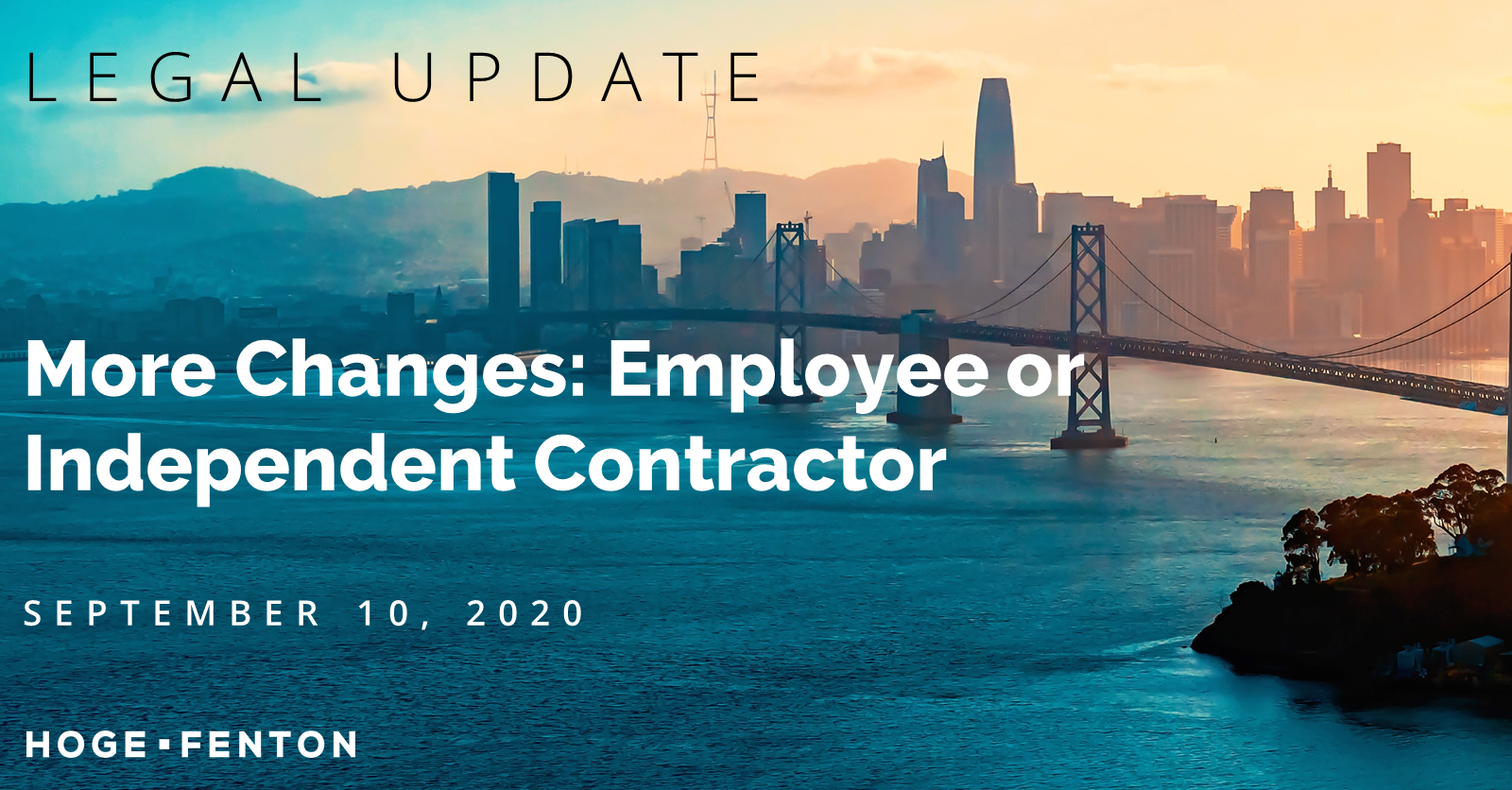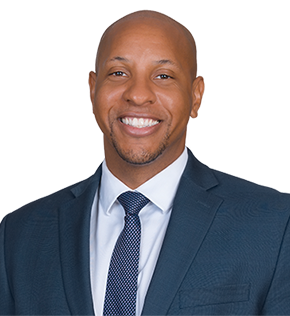More Changes: Employee or Independent Contractor
By Hoge Fenton | 09.10.2020 | Client Alerts

By Sarju Naran and Embert Madison, Jr.
On September 4, 2020, Governor Gavin Newsom signed AB 2257 into law, which substantially revises California’s controversial AB 5—the infamous law that requires most independent contractors to be designated as employees.
AB 5 Revisited
AB 5 went into effect January 1, 2020, and it codified the landmark 2018 California Supreme Court Dynamex decision, which established a 3-part test known as the “ABC test” to determine if workers are employees or independent contractors. Under the ABC test, workers are deemed employees unless their hiring business can show (1) they operate autonomously, free from the control and direction of the hiring company, (2) they perform work that is outside the usual course of the hiring company’s business, and (3) they are regularly and independently engaged in the trade, occupation, or business for which they are engaged by the hiring business. AB 5 expanded the reach of Dynamex by making the ABC test the default test for all Labor Code, Unemployment Insurance Code, and Wage Order claims.
AB 5 also exempted several specified occupations from the application of the ABC test and provided that these relationships are instead governed by the multi-factor balancing test previously adopted in the 1989 case of S. G. Borello & Sons, Inc. v. Department of Industrial Relations (the Borello factors). The California State Legislature’s decision to exempt certain industries and occupations from the ABC test while failing to exempt others has led to much confusion, controversy, and resistance over the last year, including the pursuit of a ballot measure (Proposition 22) by “gig economy” companies such as Uber and Lyft.
What Does AB 2257 Change?
Business-to-Business Contracting
AB 2257 clarifies the exemption created by AB 5 for bona fide “business-to-business” relationships by requiring that specific terms be included in a written contract, permitting a business service provider to use a personal residence as a place of business, and requiring the business service provider to provide its own materials necessary to perform the services. AB 2257 also expands the exemption to apply to public agencies and quasi-public corporations.
Single-Engagement Exemption
Second, AB 2257 creates an exemption from the ABC test for individual business people who contract to provide services at a single-engagement event, such as independent musicians who perform at a non-reoccurring event.
Referral Agency Exemption
AB 5 already provided that Dynamex and the ABC test do not apply when a referral agency acts as a third-party broker to refer certain service providers to clients. AB 2257 revises the criteria for the referral agency exemption and it expands the exemption to include a non-exclusive list of such referred services as consulting, wedding and event vendors, youth sports coaching, and caddying. Most notably, it expands the exemption to include agency referrals to almost all industries and it creates the framework for professionals of all variety (e.g., translators) to create a small business and work with a referral agency for referrals and payment processing.
Professional Services Exemption
AB 2257 expands the already lengthy list of occupations that may qualify for an exemption from the ABC test. The following occupations, in addition to those originally identified in AB 5, are now subject to the Borello factors: underwriters, content contributors, advisors, producers, narrators or cartographers for certain publications (provided they do not displace existing employees), specialized performers hired to teach a class for no more than a week, appraisers, registered professional foresters, and home inspectors.
AB 2257 also lifts the prior “35 submission” limit and exempts freelance writers, still photographers, photojournalists, and editors, regardless of how many content submissions they provide to a single hiring entity. Instead of having to satisfy the ABC test, the Borello factors will apply to these occupations so long as (a) the individual providing the services does not directly replace an employee who performed the same work at the same volume for the hiring entity, (b) the individual does not primarily provide services at the hiring entity’s business location, and (c) the hiring entity does not prevent the individual from providing services to more than one hiring entity.
Entertainer and Performer Exemption
AB 2257 creates new exemptions from the ABC test for the following entertainment industry occupations that are involved in creating, marketing, promoting or distributing sound recordings or musical compositions: recording artists, songwriters, lyricists, composers, proofers, managers of recording artists, record producers and directors, musical engineers and mixers, vocalists, photographers, independent radio promoters and certain types of publicists. This exemption also allows self-directed musicians to work with other musicians without their business relationship being subject to the ABC test. Instead, their worker classification will be governed by the multi-factor balancing test set forth in the Borello decision. Additionally, musicians who perform at a concert are exempt from the ABC test unless they (a) perform as a symphony orchestra, in a musical theater, or at a theme park or amusement park, (b) are an event headliner in a venue with more than 1,500 attendees, or (c) perform at a festival that sells more than 18,000 tickets per day. Finally, comedians, improvisers, magicians and illusionists, mimes, spoken word performers, storytellers, and puppeteers who perform original work they created will qualify for this exemption if they are free from the hirer’s control, retain the intellectual property rights related to their performance, set their terms of work, and negotiate their rates.
Takeaways
Most notably, AB 2257 does not include an exemption for gig economy companies, franchising, trucking, or motion picture and television industries.
Navigating the complicated and ever-evolving changes to employment law is what we do. If your business is looking to hire an independent contractor, please contact our trusted advisors to ensure you are doing so in a manner that is compliant with current law.
Meet Our Trusted Advisors
 |
Sarju Naran is a zealous advocate for his clients and approaches litigation with creativity and strategy. Chair of Hoge Fenton’s Employment Law Group, Sarju’s experience spans from representing middle-market and family-owned closely held businesses to large multi-national companies. He regularly litigates and provides advice and counsel to companies on wage and hour issues, trade secret misappropriation, employee mobility, wrongful termination, performance management, and leaves of absence. |
 |
Embert Madison, Jr. is a transactional associate and his practice focuses on real estate, employment advice and counsel, and cannabis regulation. He has represented clients in commercial real estate transactions throughout California, Texas, and Florida. Embert has extensive cannabis regulatory experience representing both local governments and private businesses. He has drafted cannabis business and zoning regulations for nine cities in Northern and Central California, and represented these entities during public hearings, private negotiations, and in cannabis related litigation. |
This information is provided as an educational service by Hoge Fenton for clients and friends of the firm. This communique is an overview only, and should not be construed as legal advice or advice to take any specific action. Please be sure to consult a knowledgeable professional with assistance with your particular legal issue. © 2020 Hoge Fenton










